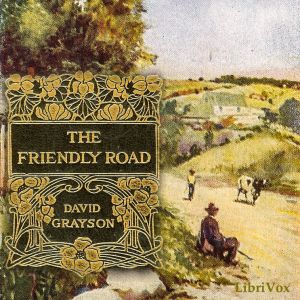
My grandmother Gertrude received a copy of The Friendly Road for Christmas in 1919. It must have been a special gift book–green leather binding, gold embossing, a sheet of tissue paper protecting the color plate facing the title page–this a painting of a solitary man enjoying a swim in a sun dappled stream with the caption “Surely it is good to be alive at a time like this.”
Written in first person, pseudo autobiographical style, the “author” of The Friendly Road, David Grayson, is a writer,* living on a farm with cows to milk, and ducks and pigs to feed, and fields in need of plowing. One day he just slings a few belongings in a pack and walks off, leaving the cows unmilked and his sister Harriet standing in the doorway. “My sober friend,” Grayson writes, “have you ever tried to do anything that the world at large considers not quite sensible, not quite sane? Try it!” The rest of the book is an odd mixture of nostalgia for a gentler, kinder age; adventures, as Grayson relies on the charity of strangers to get by; with a bit of progressive politics thrown in. After bumming for several days, Grayson arrives in the “City,” where a strike is in progress. He sympathizes with the workers, but he is appalled by “the ill-smelling streets and dirty sidewalks and swarming human beings . . . the evidences of poverty, dirt, and ignorance.” And guess what? He returns home to his farm, and Harriet bakes him a rhubarb pie.
Gertrude, who had immigrated from Germany to the United States in 1892 at the age of 17, was 44 years old that Christmas. She was living on a fruit ranch in western Washington state, with her husband, a school teacher, also a German immigrant, whom she had married in 1898. She had 6 children, the oldest 20, the youngest only 2. The last few years had not been easy for this family. Gertrude’s 10-year old daughter Mary, my mother, was slowly limping towards recovery from a bout of polio. Worse yet, during World War I Gertrude’s husband was unjustly accused of being a “German sympathizer” despite the fact that his oldest son was a U.S. Army volunteer, and he was forced from his teaching post. His job loss meant more work for Gertrude, because, as my grandfather later explained to a journalist, after losing his job, he decided to “retire” to the country–“to live calmly, read Homer and Goethe and Balzac and Emerson (and) raise fruit and chickens.”**
Gertrude entrusted several of her favorite books to my teenage self before she died in 1958. Another was a book of poems entitled Because I Love You, inscribed to Gertrude as a birthday present in 1897 by a young man who was not my grandfather! Books. . . choices . . .
*David Grayson was a pseudonym used by the actual author of The Friendly Road, Ray Stannard Baker.
**Louis Adamic ,”A Man from the Black Forest,” in Two Way Passage (1941).
( summary by Sue Anderson)

Other Audiobook
Audiobook: Actions And Reactions
A collection of short stories by the author of the Jungle book, Kim and Just
Audiobook: Rescue from Death, with a Return of Praise
A sermon, preached after the cessation of the 1625-1626 plague in London, where “from above
Audiobook: Italian Cook Book
One of the beneficial results of the Great War has been the teaching of thrift
Audiobook: History of England, from the Accession of James II – (Volume 4, Chapter 19)
This is volume 4 chapter 19 of a series of books written by the Baron
Audiobook: Third Circle
Sixteen short stories by the American novelist Benjamin Frank Norris Jr (1870-1902) who wrote predominantly
Audiobook: Greek View of Life
“With the Greek civilisation beauty perished from the world. Never again has it been possible
Audiobook: Self Help; with Illustrations of Conduct and Perseverance
Self-Help is the book that gave its name to the whole genre of literature known
Audiobook: Mutual Aid: A Factor of Evolution
Mutual Aid: A Factor of Evolution is a book by Peter Kropotkin on the subject
Audiobook: Die Entstehung der Kontinente und Ozeane
Dies ist das erste Buch, in dem Alfred Wegener seine Theorie der Kontinentalverschiebung darlegt. Zeit
Audiobook: Oration by Frederick Douglass Delivered on the Occasion of the Unveiling of the Freedmen’s Monument, April 14, 1876
This is the speech given by Fredrick Douglass at the unveiling of the Freedmen’s Monument
Audiobook: De l’esprit des lois, livres 01-13
« Cet ouvrage a pour objet les lois, les coutumes et les divers usages de
Audiobook: Dot and the Kangaroo
Dot and the Kangaroo, written in 1899, is a children’s book by Ethel C. Pedley